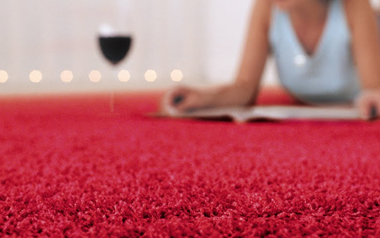
Carpets
Nylon,Polyester
Carpet is one of the softest flooring materials available, providing a cushioned surface for your feet in almost any location. It's important to know the characteristics of the different types of carpeting available, to ensure you get a style that's appropriate for your installation space.
Carpets are available in various kind of materials depending on the location of its application.
Very soft, durable, and resistant to stains, nylon is the most popular carpet material and is used in roughly three quarters of all manufactured pieces.
These fibers are prized because they are able to hold vibrant, dramatic colors that do not fade much over time. They are non-allergenic, and in many cases this material is crafted from recycled plastic bottles making it eco-friendly. The only drawback is that it's susceptible to having its fibers flattened under repeated exposure to weight, making it a bad choice for high traffic areas.
Almost as soft as nylon, these fibers are extremely resilient and resistant to stains, mildew, and shedding.
This is a natural, luxurious, long lasting material that is the softest carpet fiber you can find. Unfortunately low grade wool is more susceptible to staining, while high grade wool is extremely expensive. Some manufacturers combine wool with synthetic fibers in order to create a carpet with the benefits of both.
Carpet is made by looping yarn through a piece of backing material in a movement that is similar to sewing a button on a shirt. These loops can then either be left intact or cut at various angles. The way the loop is treated is known as the carpet pile. Below you will find the most common carpet pile types available for your flooring.
Also known as "loop pile" or "berber pile." This method leaves the entire loop intact on the surface of the piece. These carpets tend to be highly durable, easy to clean, and resistant to stains, making them perfect for high traffic commercial applications. Uncut pile carpets also don't show indentations caused by footprints and vacuum marks.
The drawback is these carpets tend to be less soft and padded than their cut counterparts. Also the loops can be a snagging hazard if you have pets or small children.
This method tends to produce very soft, pleasant looking carpets that are easy to clean. The drawback is that the rigid nature of the threads makes it easier to see foot marks and vacuum trails. It also makes wear and tear more obvious, which means that these carpets need to be replaced more often.
These are manufactured by Colorature Carpet Industries, Haryana – India. FloorKraft, HL Carpet excels in the field of carpet manufacturing from concept development to production of a single rug or huge hospitality projects. Having carpet manufacturing facility in India & producing over 20,000 sq. mt of carpets every month, we are one of the largest carpet manufacturer in India and custom made carpet manufacturer importer in UAE. Our carpets are distributed throughout U.S.A, Europe, Middle East and far East by high end design trade showrooms, boutique rug stores, large Department stores & Hospitality concept designers for Hotels, Palaces, Villas & Resorts.
Weaving a hand-knotted rug requires skill and time. The quality of a hand-knotted carpet is determined by the number of knots per square inch, and a higher density means better quality.
A hand tufted rug is made by punching strands of wool into a canvas which is stretched on a frame. This is accomplished with the help of a hand operated tool. This process is not very time intensive, and does not require the same level of skill that hand-knotting does.
FloorKraft prides itself on having the most exquisite handmade hand tufted, hand knotted carpets & rugs, shaggy & handmade broadloom wall to wall carpets.Nylon,Polyester
Home,Offices
Restaurant, Houses,Offices
Hospital,Chemical Industries,Kitchens
Car Parks, Industries, Hospitals
Outdoors, Indoors,Software Companies, Telecom Companies
